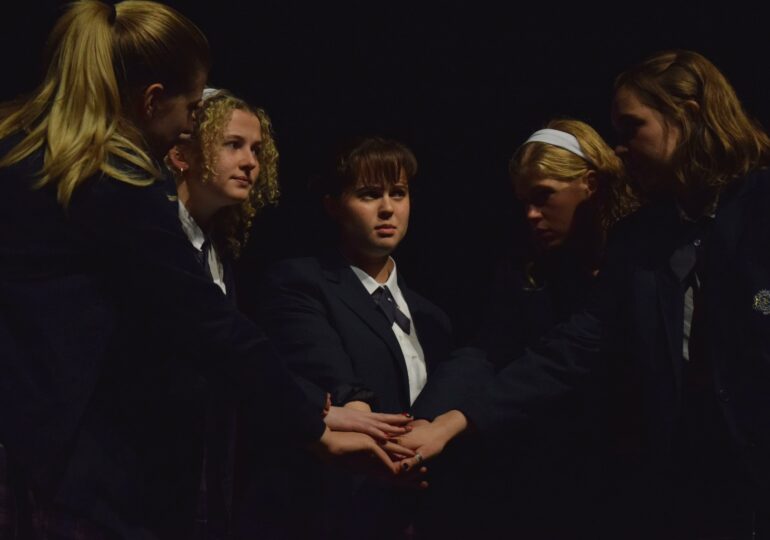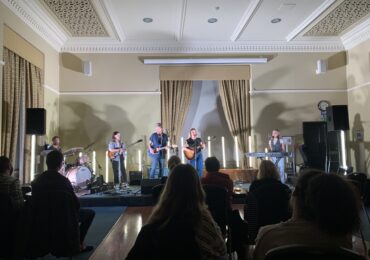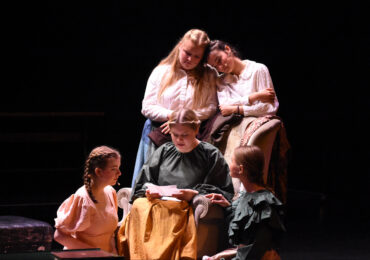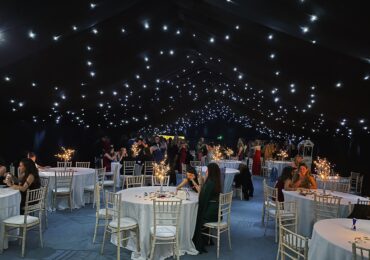When I was invited to view the UK premiere of Erica Schmidt’s production of Mac Beth performed by St Andrews students,
I admit that I was initially sceptical. Firstly, I had no idea about Erica Schmidt’s adaptation of the classic Macbeth and frankly I was slightly confused why everyone in the email had spelt it wrong. If, like me, you have clicked on this article without any foreknowledge of this production I shall provide a short summary:
Erica Schmidt’s adaptation is a work of metatheatre in which a group of school girls are performing Macbeth. There are twists and turns throughout the piece as the audience becomes invested in the idea of female rage that is, even in adolescence, present. It has an all-female cast and is a different adaptation of the traditional play and is thus Mac Beth.
Now, I won’t spoil what these twists and turns are in the play, but from that summary you are about as caught up as I was when I eventually came to take my seat in the Buchanan lecture theatre. The lights dimmed. The music started. The girls came on. Picture St Trinian’s meets theatre as each schoolgirl who entered the stage had a twist on their outfit that slowly became more bedraggled as the play progressed. An example of such was MacDuff, played by Louise, who took a more tom-boyish approach with a shirt unbuttoned and a longer skirt compared to the illustrious Lady Macbeth, played by Clara, who kept her appearance almost perfect, with her shirt tucked in until the end.
This performance had a difficult task ahead of it. The story of Macbeth is as infamous as the characters in the play themselves. It is a story of murder and intrigue yes, but it has also been repeatedly performed. Would changing the cast to all-female really make such an impact? Personally, I enjoyed the manipulation of Shakespeare to apply it to teenage girls, a demographic that is often overlooked in terms of theatre. When speaking to Hannah who played Macbeth, she stated that: “The contrast between the modernity and the Shakespearean language speaks to the commonality that can be found in Shakespeare’s works for everyone.” She went on to describe how playing the role allowed for a shift in the expected masculine energy that traditionally emanates from the title character. Perhaps in performing Shakespeare with an all-female cast we are offered re-readings of stereotypical characters (the wife, the jester, the king, the witches etc.), that allow Shakespeare to be accessible to modern times. Schmidt’s production is one in a trend of all-female Shakespeare productions such as King Lear which performed in Manchester in June 2023. Clearly there is a demand for a female exploration of Shakespeare and St Andrews students are happy to help meet it.
The cast met the challenges demanded by this play well, with the witches played by Ellen, Laura and Jess, most obviously having to change their voices and behaviour as they actively swapped roles all whilst remaining on the stage. The lack of scene changes meant the actors took cues off one another, as Ellen told me, and utilised music to reset the atmosphere of the performance without having to physically change the set. The informality provided by the set and modern music attempted to draw a connection between the audience and performer, asking them to believe the metatheatre whilst also asking for some understanding to the girls’ behaviour.
Ultimately though I did leave the play slightly confused and I am unsure whether the ending is something I personally approve of. Despite understanding Schmidt’s motivations, I struggled to draw the connection between the Macbeth being performed and the schoolgirl’s reality in the second play. Regardless, I can appreciate that theatre is not necessarily meant simply for widespread enjoyment, but as an artform it is always trying to evolve and adapt to create new performances with new meanings. In this light I can appreciate how feminine rage is not something we typically associate with younger girls and perhaps this dismissive attitude towards adolescents under eighteen needs to be processed through cultural depictions such as theatre.
This new approach to Shakespeare that productions such as Schmidt’s are taking, highlights the relevance Shakespeare continues to have in our society. I came to this play expecting Macbeth and I left confused and slightly angry, and I think in part that was the point. To have your expectations inverted and manipulated and to remind us that characters we think we know are really strangers. By the end of the play you believe what the witches told us from the very start: ‘fair is foul, and foul is fair’.
A final note: this production was raising money for Fife’s Women’s Aid with 100% of ticket revenues going towards this. If you would like to donate please see https://fifewomensaid.org.uk/get-involved/donate/ and their telephone number for 24 hour support is 0808 802 5555
Cast List:
Director – Lila Patterson
Producers – Isabel Alexander and Abby Kelley
Ottavia Morfino – Stage Manager
Ellie Trace – Publicist
Macbeth – Hannah Shiblaq
Lady Macbeth – Clara Curtis
Witch 1 – Ellen Rowlett
Witch 2 – Laura Kibedi Makfalvi Varga
Witch 3 – Jess Payne
Banquo – Poppy Kimitris
Macduff – Louise Windsor







